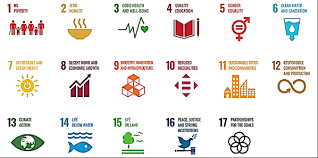The Seventeen Sustainable Development Goals: A Blueprint for a Better Future
The United Nations has set forth seventeen Sustainable Development Goals (SDGs) to address global challenges and create a more sustainable and equitable world by 20
These goals cover a wide range of issues, from ending poverty and hunger to promoting quality education and clean energy.
No Poverty
Goal 1 aims to eradicate extreme poverty globally by implementing social protection systems and ensuring equal rights to economic resources.
Zero Hunger
Goal 2 focuses on ending hunger, achieving food security, improving nutrition, and promoting sustainable agriculture.
Good Health and Well-being
Goal 3 aims to ensure healthy lives and promote well-being for all at all ages through access to healthcare services and disease prevention.
Each of the seventeen SDGs plays a crucial role in building a better future for all. By working towards these goals collectively, we can create a more sustainable, inclusive, and prosperous world for current and future generations.
Understanding and Engaging with the Seventeen Sustainable Development Goals: Key Questions and Insights
- What are the Seventeen Sustainable Development Goals?
- Why are the Sustainable Development Goals important?
- How can individuals contribute to achieving the Sustainable Development Goals?
- What progress has been made towards achieving the Sustainable Development Goals?
- How do governments and organisations track and measure progress on the Sustainable Development Goals?
What are the Seventeen Sustainable Development Goals?
The Seventeen Sustainable Development Goals, established by the United Nations, are a set of global objectives aimed at addressing pressing challenges and fostering sustainable development worldwide. These goals encompass a wide range of areas such as poverty eradication, quality education, clean energy, gender equality, and climate action. Each goal outlines specific targets and indicators to guide countries in their efforts to achieve a more equitable and sustainable future for all. By working towards these goals collectively, nations can make significant progress in creating a better world for current and future generations.
Why are the Sustainable Development Goals important?
The Sustainable Development Goals are crucial as they provide a universal framework for addressing pressing global challenges and promoting sustainable development worldwide. These goals serve as a roadmap for governments, organisations, and individuals to work together towards creating a more equitable, prosperous, and environmentally friendly future. By focusing on areas such as poverty alleviation, education, healthcare, gender equality, and climate action, the SDGs aim to improve the quality of life for all people while safeguarding the planet for future generations. Achieving these goals is essential for building a more resilient and inclusive world where everyone can thrive.
How can individuals contribute to achieving the Sustainable Development Goals?
Individuals play a crucial role in contributing to the achievement of the Seventeen Sustainable Development Goals (SDGs) through their everyday actions and choices. By raising awareness about the SDGs and advocating for sustainable practices in their communities, individuals can drive positive change. Simple actions such as reducing waste, conserving energy, supporting ethical brands, volunteering for relevant causes, and educating others about the importance of sustainability can all make a significant impact towards achieving the SDGs. Additionally, individuals can engage with policymakers, businesses, and organisations to promote policies and initiatives that align with the SDGs, fostering a collective effort towards a more sustainable and equitable future for all.
What progress has been made towards achieving the Sustainable Development Goals?
Progress towards achieving the Sustainable Development Goals has been a mixed bag since their inception. While some areas have seen significant advancements, such as improvements in access to education and healthcare, challenges remain in other key areas like poverty eradication and climate action. Global efforts have led to positive outcomes in certain regions, but disparities persist across countries and communities. Continuous monitoring, collaboration, and innovative solutions are essential to accelerate progress and ensure that the Sustainable Development Goals are met by the target year of 2030.
How do governments and organisations track and measure progress on the Sustainable Development Goals?
Governments and organisations track and measure progress on the Sustainable Development Goals (SDGs) through a variety of methods and indicators. One common approach is the establishment of national frameworks and action plans that outline specific targets, timelines, and responsibilities for achieving the SDGs. Governments often collect data on key performance indicators related to each goal, such as poverty rates, access to education, healthcare outcomes, and environmental sustainability metrics. International organisations also play a crucial role in monitoring progress by providing guidance, technical assistance, and data analysis tools to help countries assess their advancement towards the SDGs. Regular reporting and review processes at both national and global levels help ensure accountability and encourage continuous improvement in efforts to achieve the seventeen SDGs.

No Responses